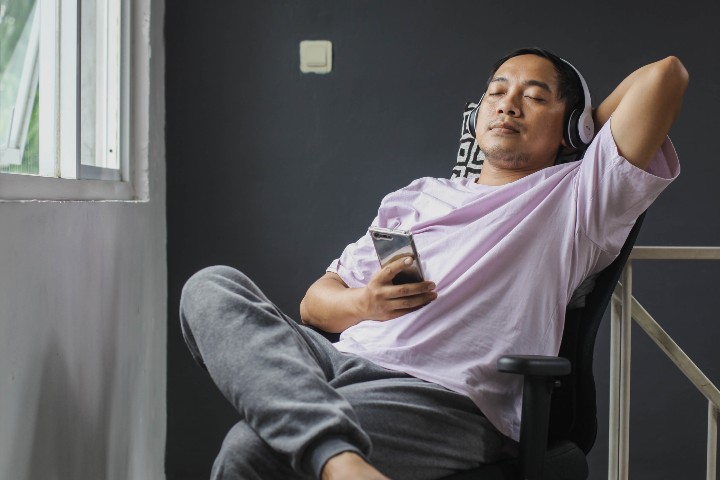Audiobooks have opened up a whole new realm of learning and enjoyment for readers to a degree that hard-copy books can never allow.
But do you know that the aural interaction of listening to books can still happen, even when you are sound asleep?
Here’s if Listening to Audiobooks While Sleeping Works:
Listening to an audio recording during slumber is undoubtedly possible since your sleeping brain is far from idle. The auditory cues you subconsciously listen to during a specific phase in your sleep cycle can help strengthen retention of the things you willfully studied when awake.
Learning a piece of entirely new knowledge or absorbing complex information when listening to an audiobook while sleeping is unlikely.
You need to have studied the material consciously and deliberately when you are wide awake, so reinforcement can happen when snoozing.
Can We Learn Subconsciously While Sleeping?
Yes. Several studies have already established that some forms of learning can happen when you are asleep.
Depending on what you hear during the night, it is more than possible to bolster existing memories and boost your recall after waking up.
This memory enhancement happens during the slow-wave sleep, or the deepest part of your sleep cycle.
Slow-wave sleep is the third non-rapid eye movement (NREM) sleep stage. This is the phase where your body is in its most relaxed state.
The slow-wave sleep typically lasts for between 70 and 90 minutes. During this stage, your brainwaves are at their slowest.
It is also believed that short-term memories are transferred to long-term memory storage during slow-wave sleep.
Researchers have discovered that the slow-wave sleep stage is the most conducive for enhancing memory. At this time, your mind is active and can reinforce the information you learned while awake.
This is different from the fallacious concept of learning new material simply by listening at night.
Memory enhancement while listening to audiobooks, for example, can happen for those memories you have already learned.
The recently acquired information can be reactivated during sleep, thereby enhancing that existing memory.
It was believed that the mind was most active during rapid-eye-movement (REM) sleep. This is the stage where most dreams occur. REM is also when areas of the brain are stimulated to aid in learning.
Recently studies have shown, however, that slow-wave sleep is where significant mental activities take place. As such, it is a crucial period for memory processing.
As your mind habitually reviews your day’s event during night sleep, intentional reinforcement of memories happens.
The neural process that supports this phenomenon is the sleep spindles – bursts of oscillatory brain activity during stage two of non-REM sleep.
These sudden spikes in your brain activity assist in processing significant memory features when you sleep.
During slumber, you refine the new information you learned when you were awake. The auditory cues make it easy to retrieve and apply them correctly when needed.
Over the years, scientists have studied the modification of sleep spindles to strengthen memories acquired within the day.
This is also said to help retain healthy brain functions.
Meanwhile, some researchers point out that the more you are exposed to audio overnight, the more you spend in the slow-wave sleep phase.
So if you are listening to an audiobook more often than usual, the better your brain will be able to preserve essential recollections.

Should You Listen to Audiobooks While Sleeping?
Certainly. Now that you know your brain is active when you sleep and can absorb information, there is no reason why you should not take advantage of its capabilities.
However, you should keep in mind that the memories you form during sleep are implicit.
This means that any form of learning will be extremely basic and much simpler than what your brain can accomplish if you study consciously.
Listening to audiobooks on computer science while sleeping will not suddenly make you an expert on the subject.
This is the same if you are trying to learn a new language. Listening solely to audiobooks while asleep will not get you anywhere.
It will not help increase your understanding of that specific language, at least without exerting any effort to learn while awake.
To become fluent in a foreign language, you need to understand the structure, grammar, and vocabulary to speak it properly.
Language learning is also presumed to involve your episodic memory. This means you need to remember the actual event you study a specific word, including where you were and who you were with.
You also need to link the word to other related terms in your mental lexicon. Interestingly, moving the word from the episodic memory to your internal dictionary occurs in your sleep.
If you want to learn a language, the best way is through instruction, such as taking a class.
Exposure also helps as it forces you to recall words you previously learned. Listening to a language in everyday contexts makes it easier to make it stick to memory.
This also helps you recognize different aspects of the language, including accent, tone, and meaning.
Language exposure while sleeping works, but there is a catch. You need to be listening to material that you are already familiar with.
It will not do you any good to listen to words you have never heard before.
A helpful piece of advice is to listen to an audio recording of your classes and replay it at night. This will let you access your episodic memory and help you retain information better.
If you are using an audiobook, listen to it during the day, then play it again when sleeping.
Listening to audio lessons during a snooze can reinforce the things you already learned so you can remember them better.

For example, a one-hour nap after a learning session usually helps your brain absorb everything. This is enough to let whatever you studied sink in and long enough to experience deep sleep.
When you set an audio version of the same lesson on loop, you have better chances of retaining the essential pointers than if you just napped without audio.
You should bear in mind some practical considerations when listening to audiobooks while sleeping.
If you take a nap, set your alarm to not doze for more than 90 minutes. Sleeping for longer will send you to REM sleep, and you will probably miss the critical time reserved for slow-wave sleep.
You should also consider the length of your audiobook. It should be long enough to still be playing while you are in the non-REM sleep stage.
More importantly, you should keep the volume level to just audible, neither loud nor quiet, so the sound of your audiobook will not prevent you from falling asleep.
If you are a hypersensitive sleeper who wakes up at the slightest sound, listening to audiobooks while sleeping may not work for you.
Instead of having your conscious memories consolidated during sleep, you may end up foregoing a much-needed shuteye altogether.
But then again, some findings reveal that tuning into audiobooks aids in sleeping as it can distract the mind from the usual disrupting noises or day thoughts.
The calming narration can take the edge off and lull you to sleep, so do not knock it off before trying it.
Of course, audio or without audio, sleeping is imperative if you want to learn at all. It is vital for good cognitive functions.
If you are sleep-deprived, you will likely struggle with focusing or paying attention.
Quality sleep can bolster your learning and memory. At the same time, it is essential for your good health.
In contrast, lack of sleep impairs the memory consolidation process happening in your brain. It also leaves you feeling drained of energy.
To ensure you are always ready to learn, you should take some time to rest.
Sources:
Science Alert: 4 Things You Can Actually Learn While You Sleep
Smithsonian Magazine: We Really Can Learn While We Sleep
Live Science: Can You Learn Anything While You Sleep?
Medical News Today: Can you learn in your sleep?
